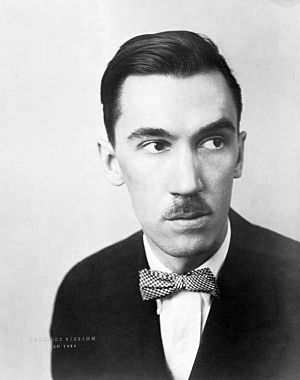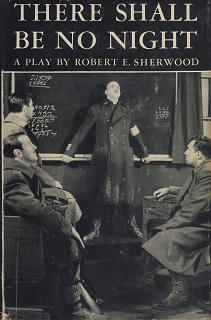Robert E. Sherwood facts for kids
Quick facts for kids
Robert E. Sherwood
|
|
|---|---|

Sherwood in 1928
|
|
| Born | Robert Emmet Sherwood April 4, 1896 New Rochelle, New York, U.S. |
| Died | November 14, 1955 (aged 59) New York City, U.S. |
| Occupation |
|
| Alma mater | Milton Academy Harvard University |
| Notable works | Waterloo Bridge Idiot's Delight Abe Lincoln in Illinois Rebecca There Shall Be No Night The Best Years of Our Lives The Bishop's Wife |
| Notable awards | Pulitzer Prize for Drama (1936, 1939, 1941) Academy Award for Best Screenplay (1947) Pulitzer Prize for Biography (1948) |
| Spouse | Mary Brandon (m.1922–div.1934) Madeline Hurlock (m.1935) |
Robert Emmet Sherwood (born April 4, 1896 – died November 14, 1955) was a famous American writer. He wrote plays for the theater and screenplays for movies.
Some of his most well-known works include the plays Waterloo Bridge, Idiot's Delight, Abe Lincoln in Illinois, and There Shall Be No Night. He also wrote screenplays for movies like Rebecca, The Best Years of Our Lives, and The Bishop's Wife.
Sherwood won many important awards for his writing. He received the Pulitzer Prize for Drama three times (in 1936, 1939, and 1941). He also won an Academy Award for Best Screenplay in 1947 and the Pulitzer Prize for Biography or Autobiography in 1948.
Contents
Early Life and Family Background
Robert Emmet Sherwood was born in 1896 in New Rochelle, New York. His father, Arthur Murray Sherwood, was a wealthy stockbroker. His mother, Rosina Emmet Sherwood, was a talented artist who drew pictures and painted portraits.
Robert's grandmother, Mary Elizabeth Wilson Sherwood, was also a writer and a leader in society. His family had a long history, including a famous Irish nationalist, Robert Emmet, who was executed in 1803. Several other relatives were well-known American portrait artists.
Education and Early Career
Sherwood went to Fay School and Milton Academy. Later, he studied at Harvard University.
During World War I, he fought in Europe with the Royal Highlanders of Canada. He was injured during the war. After returning to the United States, he started working as a movie critic. He wrote for popular magazines like Life and Vanity Fair.
Writing Career and Famous Friends
Robert Sherwood was one of the first members of a famous group of writers and artists called the Algonquin Round Table. This group met regularly in New York City starting in 1919. He was good friends with writers like Dorothy Parker and Robert Benchley, who also worked at Vanity Fair with him. Author Edna Ferber was another close friend.
Sherwood's Height and Humor
Sherwood was very tall, standing 6 feet 8 inches (about 203 cm). His friend Dorothy Parker, who was much shorter, once joked that when she, Sherwood, and Robert Benchley walked together, they looked like "a walking pipe organ." Robert Benchley, another tall friend, once stood on a chair to show how much Sherwood had grown when they first met.
Even famous comedian Groucho Marx joked about Sherwood's height. During a radio show, Marx told a story about Sherwood. He said he asked Sherwood what he told people who asked about the weather "up there." Sherwood replied, "I spit in their eye and tell ‘em it's raining."
Plays and Themes
Sherwood's first play on Broadway was The Road to Rome (1927). It was a comedy about Hannibal's failed attempt to invade Rome. This play introduced a theme Sherwood often wrote about: how pointless war can be. Many of his later plays explored this idea.
For example, his play Idiot's Delight (1936) won him his first Pulitzer Prize. Sherwood once joked that he would start with a big message but end up with just good entertainment.
Sherwood also worked to support writers' rights in the theater world. He was the president of the Dramatists Guild of America from 1937 to 1939.
Hollywood and World War II
Sherwood's success in theater led him to Hollywood, where he started writing for movies in 1926. He wrote many films, including adaptations of his own plays. He also helped write the screenplay for the famous movie Rebecca (1940).
When World War II began in Europe, Sherwood changed his views on war. He decided to support the fight against the Third Reich (Nazi Germany). His 1940 play, There Shall Be No Night, was about the Soviet Union's invasion of Finland. It showed his support for fighting against aggression.
During this time, Sherwood also worked as a speechwriter for President Franklin D. Roosevelt. He wrote a book about his experiences called Roosevelt and Hopkins: An Intimate History. This book won the Pulitzer Prize for Biography or Autobiography in 1949. Sherwood is also known for coming up with the phrase "arsenal of democracy," which President Roosevelt often used in his wartime speeches.
After the war, Sherwood returned to writing plays and movies. He wrote the screenplay for The Best Years of Our Lives (1946). This movie was about three soldiers returning home from war and how their lives changed. It earned Sherwood an Academy Award for Best Screenplay.
Later Life and Legacy
Robert Sherwood passed away from a heart attack in New York City in 1955. His last play, Small War on Murray Hill, was shown on Broadway after his death in 1957.
Sherwood's life and work have been remembered in different ways. For example, an actor named Nick Cassavetes played him in the 1994 movie Mrs. Parker and the Vicious Circle, which was about the Algonquin Round Table.
Plays Written by Robert E. Sherwood
- The Road to Rome (1927)
- The Love Nest (1927)
- The Queen's Husband (1928)
- Waterloo Bridge (1930)
- This Is New York (1930)
- Reunion in Vienna (1931)
- Acropolis (1933)
- The Petrified Forest (1935)
- Tovarich (1935)
- Idiot's Delight (1936), won a Pulitzer Prize for Drama
- Abe Lincoln in Illinois (1938), won a Pulitzer Prize for Drama
- There Shall Be No Night (1940), won a Pulitzer Prize for Drama
- The Rugged Path (1945)
- Miss Liberty (1949)
- Small War on Murray Hill (1957), shown after his death
Nonfiction Books
- Roosevelt and Hopkins: An Intimate History (1948), won a Pulitzer Prize for Biography
See also
 In Spanish: Robert Emmet Sherwood para niños
In Spanish: Robert Emmet Sherwood para niños
 | Percy Lavon Julian |
 | Katherine Johnson |
 | George Washington Carver |
 | Annie Easley |


